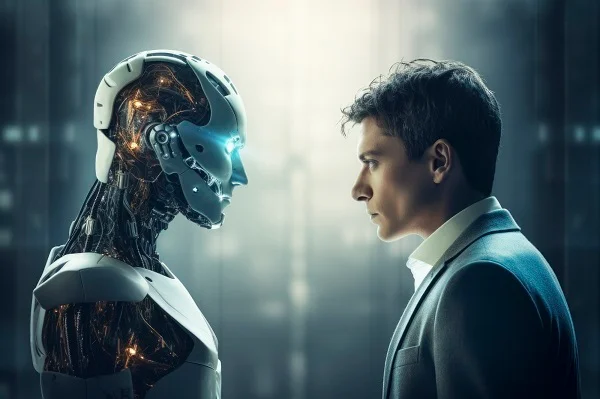Artificial Intelligence (AI) has rapidly integrated into our lives, revolutionizing industries and shaping the way we work, receive healthcare, and handle daily tasks. Once a concept limited to science fiction, AI is now a reality, impacting everything from business operations to personal convenience. This article explores the profound influence of AI on work, healthcare, and daily living.
The Role of AI in the Workplace
AI has reshaped the workplace by automating routine tasks, increasing efficiency, and fostering innovation. Many industries have adopted AI-driven solutions to enhance productivity and streamline operations.
1. Automation and Efficiency
Businesses leverage AI-powered tools to automate repetitive tasks such as data entry, scheduling, and customer support. Chatbots and virtual assistants reduce the need for human intervention, allowing employees to focus on strategic and creative tasks.
2. Enhancing Decision-Making
AI-driven analytics assist organizations in making data-driven decisions. Machine learning algorithms analyze large datasets to identify patterns and trends, providing valuable insights for better business strategies. These advancements are critical in reshaping industries and driving innovation across multiple sectors.
3. Job Evolution and Skill Development
While AI automation replaces some traditional jobs, it also creates new opportunities requiring advanced technical skills. Employees now focus on learning AI-related competencies, such as programming and data science, to stay competitive in the evolving job market.
AI’s Impact on Healthcare
The healthcare sector has experienced remarkable advancements due to AI, improving patient care, diagnosis accuracy, and medical research.
1. Early Disease Detection and Diagnosis
AI-powered systems analyze medical images, lab results, and patient history to detect diseases at an early stage. Technologies like IBM Watson Health and Google’s DeepMind have significantly improved the accuracy of diagnoses for conditions such as cancer and neurological disorders.
2. Personalized Treatment Plans
AI customizes treatment plans based on a patient’s unique genetic makeup and medical history. This approach supports more effective and targeted care through personalized treatment plans, ensuring treatments are tailored to each individual while minimizing adverse side effects.
3. Virtual Health Assistants
AI-driven chatbots and virtual health assistants provide 24/7 support, answering health-related queries and reminding patients to take medications. These digital assistants enhance patient engagement and improve healthcare accessibility.
AI in Daily Living
AI simplifies everyday life by making tasks more convenient, secure, and efficient.
1. Smart Home Technology
AI-powered smart assistants like Amazon Alexa, Google Assistant, and Apple Siri enable hands-free control of home devices. Smart thermostats, lighting systems, and security cameras use AI to optimize energy use and enhance security.
2. Personalized Entertainment
Streaming services such as Netflix and Spotify use AI algorithms to analyze user preferences and recommend personalized content. AI-driven recommendation engines enhance entertainment experiences by curating music, movies, and TV shows tailored to individual tastes.
3. AI in Shopping and Finance
E-commerce platforms leverage AI to provide personalized shopping recommendations, optimize inventory management, and prevent fraud. AI-driven financial tools help users manage expenses, detect fraudulent transactions, and provide investment insights.
Ethical Considerations and Challenges
Despite the benefits, AI adoption raises ethical and societal concerns. Issues such as data privacy, job displacement, and algorithmic biases require careful regulation and responsible AI development.
1. Data Privacy and Security
AI relies on vast amounts of data, raising concerns about user privacy. Companies must implement strict data protection measures to prevent unauthorized access and breaches.
2. Bias in AI Algorithms
AI models can inherit biases from training data, leading to discriminatory outcomes. Ethical AI development requires transparency, fairness, and continuous monitoring to eliminate biases.
3. Balancing Automation and Employment
While AI enhances productivity, it also leads to job displacement in certain sectors. Workforce reskilling programs and policies promoting human-AI collaboration are essential for maintaining employment stability.
Conclusion
AI is undeniably transforming the way we work, receive healthcare, and go about our daily lives. From automation and personalized medicine to smart home technologies, its impact is far-reaching and continuously evolving. As we look toward the future, it’s important to recognize AI’s transformative potential while addressing ethical challenges and ensuring responsible development. How do you think AI will shape the future of our world?





